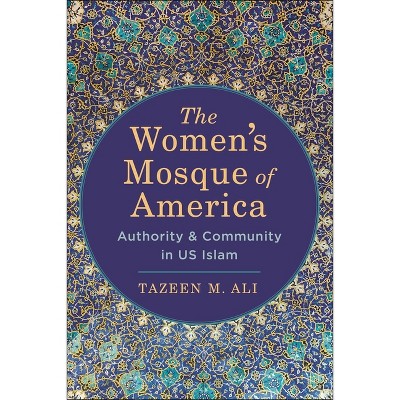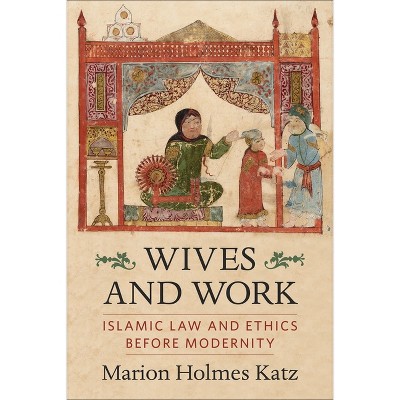Sponsored

Women in the Mosque - by Marion Katz (Paperback)
$30.00
In Stock
Eligible for registries and wish lists
Sponsored
About this item
Highlights
- Juxtaposing Muslim scholars' debates over women's attendance in mosques with historical descriptions of women's activities within Middle Eastern and North African mosques, Marion Holmes Katz shows how over the centuries legal scholars' arguments have often reacted to rather than dictated Muslim women's behavior.
- About the Author: Marion Holmes Katz has taught at Franklin and Marshall and Mount Holyoke College and is currently a professor of Middle Eastern and Islamic studies at New York University.
- 432 Pages
- Religion + Beliefs, Islam
Description
About the Book
Juxtaposing Muslim scholars' debates over women's attendance in mosques with historical descriptions of women's activities within Middle Eastern and North African mosques, Marion Holmes Katz shows how over the centuries legal scholars' arguments have often reacted to rather than dictated Muslim women's behavior.Book Synopsis
Juxtaposing Muslim scholars' debates over women's attendance in mosques with historical descriptions of women's activities within Middle Eastern and North African mosques, Marion Holmes Katz shows how over the centuries legal scholars' arguments have often reacted to rather than dictated Muslim women's behavior. Tracing Sunni legal positions on women in mosques from the second century of the Islamic calendar to the modern period, Katz connects shifts in scholarly terminology and argumentation to changing constructions of gender. Over time, assumptions about women's changing behavior through the lifecycle gave way to a global preoccupation with sexual temptation, which then became the central rationale for limits on women's mosque access. At the same time, travel narratives, biographical dictionaries, and religious polemics suggest that women's usage of mosque space often diverged in both timing and content from the ritual models constructed by scholars. Katz demonstrates both the concrete social and political implications of Islamic legal discourse and the autonomy of women's mosque-based activities. She also examines women's mosque access as a trope in Western travelers' narratives and the evolving significance of women's mosque attendance among different Islamic currents in the twentieth century.Review Quotes
[An] extremely valuable book.--Ruth Roded "Religion & Gender"
A highly scholarly work on an important but oft-ignored aspect of women in Islam.-- "The Islamic Quarterly"
Extraordinary... a rich, in-depth, and often amusing analysis of the legal debates and social records of women's mosque attendance from the eighth to the early twenty-first century.-- "Journal of the Society for Contemporary Thought and the Islamicate World"
One of the most significant contributions to Muslim women's history and to Islamic legal studies in recent decades...pioneering and magisterial.-- "Der Islam"
The book is of great importance to those interested in Muslim women's status, religious rights, and practice.... Highly recommended.-- "Choice"
This book is praiseworthy for its extensive use of textual sources, making it an excellent source for the study of intellectual discourse on women's mobility and visibility in Islam.-- "Journal of the American Academy of Religion"
This is an extremely detailed, nuanced and precise account of women's presence in the mosque over the centuries.-- "Journal of Islamic Studies"
Women in the Mosque will become an essential part of the library of every scholar concerned with Islamic ritual law, women in religion, women in Islam, and even religious architecture. There is something here for students of Islamic law, Ottoman history, Arab social history, and modern Muslim intellectual history.--Kevin Reinhart, Dartmouth College
A scholarly milestone. Women in the Mosque is a comprehensive, categorical treatment of the question of women's mosque access in Islamic law and history. Marion Holmes Katz is one of the most widely respected scholars of Islamic law and ritual in the West, and, in its scope and detail, this work is peerless to my knowledge.--Jonathan Brown, Georgetown University
Marion Holmes Katz brings to light and adds context to the fascinating history of women's access to mosques through a dexterous presentation of a wide range of legal sources, travel accounts, contemporaneous Christian and Jewish accounts, literature, and a unique sixteenth-century manuscript recounting when women contested the ruling authorities' attempt to ban them from Islam's most sacred mosque in Mecca. A must-read for anyone interested in a solid historical account related to issues of women and gender in Islam.--Intisar A. Rabb, Harvard Law School, and director of the Islamic Legal Studies Program
About the Author
Marion Holmes Katz has taught at Franklin and Marshall and Mount Holyoke College and is currently a professor of Middle Eastern and Islamic studies at New York University. She has published extensively on topics relating to Islamic law, gender, and ritual.Dimensions (Overall): 8.9 Inches (H) x 6.0 Inches (W) x 1.2 Inches (D)
Weight: 1.25 Pounds
Suggested Age: 22 Years and Up
Number of Pages: 432
Genre: Religion + Beliefs
Sub-Genre: Islam
Publisher: Columbia University Press
Format: Paperback
Author: Marion Katz
Language: English
Street Date: November 16, 2021
TCIN: 84906383
UPC: 9780231162678
Item Number (DPCI): 247-32-7444
Origin: Made in the USA or Imported
If the item details aren’t accurate or complete, we want to know about it.
Shipping details
Estimated ship dimensions: 1.2 inches length x 6 inches width x 8.9 inches height
Estimated ship weight: 1.25 pounds
We regret that this item cannot be shipped to PO Boxes.
This item cannot be shipped to the following locations: American Samoa (see also separate entry under AS), Guam (see also separate entry under GU), Northern Mariana Islands, Puerto Rico (see also separate entry under PR), United States Minor Outlying Islands, Virgin Islands, U.S., APO/FPO
Return details
This item can be returned to any Target store or Target.com.
This item must be returned within 90 days of the date it was purchased in store, shipped, delivered by a Shipt shopper, or made ready for pickup.
See the return policy for complete information.
Frequently bought together

$20.99
Buy 2, get 1 free select books, music & movies
5 out of 5 stars with 6 ratings

$15.68
Buy 2, get 1 free select books, music & movies
4.8 out of 5 stars with 190 ratings


$18.88
MSRP $27.00
Buy 2, get 1 free select books, music & movies
4.8 out of 5 stars with 571 ratings
Discover more options

$12.39
MSRP $19.99
Buy 2, get 1 free select books, music & movies
5 out of 5 stars with 2 ratings

$6.29
Buy 2, get 1 free select books, music & movies
4.6 out of 5 stars with 27 ratings

$34.00
Buy 2, get 1 free select books, music & movies
5 out of 5 stars with 1 ratings




